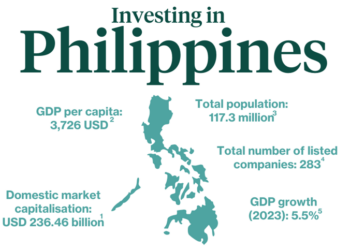No products in the basket.
Late May saw the start of the bloody siege of Marawi, a predominantly Muslim city on the island of Mindanao in the southern Philippines.
Over 170 people have been killed, including 120 militants. With the terrorist crisis in the Philippines as a backdrop, one of the hottest topics at the recent Shangri-La Dialogue in Singapore, an annual regional security conference, was the terrorism threat in Southeast Asia and the significance of Islamic State’s recent alliances with possibly as many as 30 much smaller militant groups in this region.
The fighting in Marawi shook the Philippine government into declaring temporary martial law in the south following years of unsuccessful attempts to pacify an older homegrown Muslim insurgency.
Last Monday, a roadside bomb planted by suspected Muslim insurgents killed six Thai soldiers and wounded four on Monday in the southern province of Pattani, police said.
A decades-old separatist insurgency in of predominantly Buddhist Thailand’s largely ethnic Malay, Muslim provinces of Yala, Pattani and Narathiwat has killed more than 6,500 people since 2004.
Observers believe the Armed Forces of the Philippines have been pitted against fighters from Indonesia, Malaysia, Pakistan, India, Saudi Arabia, and the Yemen.
Islamic State is already communicating in local vernaculars, and reaching out to disenchanted and restive potential followers in Indonesia, Malaysia, and the Philippines.
According to Phil Hynes
The Philippines is no longer merely an aspirational epicentre, after the events of this week in Marawi, it is confirmed as an epicentre. Mindanao is the Fergana Valley of Southeast Asia.
With recent bombings in Jakarta, regional governments have reason to be alarmed about what may be in store as Islamic State faces reversals in the Middle East and its surviving fighters disperse.
Asia is plagued by growing Islamic militancy and the morphing and cross fertilisation of different jihadist strands across the continent is accelerating.
According to Phil Hynes head of political risk and analysis of Hong Kong-based ISS Risk
The speed of this acceleration will merely increase as the Caliphate in Syria is strangled and ultimately implodes, the sooner that happens the quicker the pace of radicalisation elsewhere will increase.
Some regional intelligence sources believe there may already be 1,200 militants with Islamic State links active in the Philippines alone.
ISS Risk has identified five pivotal epicentres of jihadism in Asia which will impact the security landscape of Asia in the coming years, which are the Philippines, Bangladesh, India, Indonesia and Malaysia.
According to Phil Hynes Bangladesh is acting as a bridgehead between South and South East Asia as Malaysia is acting as the financial hub of ISIS, while the Philippines is now the main battleground and training centre for jihadists.
What happened in Marawi should serve as a wake-up call to the governments across Asia, it is the result of months of planning with clear and unambiguous objectives, and shows Maute is clearly stronger that has ever been acknowledged.
said Phil Hynes during a presentation at the Foreign Correspondents’ Club of Thailand, June 21st.
What are the risks for Thailand ?
According to Rungrawee Chalermsripinyorat, an independent analyst who has closely followed Thailand’s southern conflict
There is no evidence of connections between the southern insurgency in Thailand and ISIS. For the moment the movement remains home-grown, although BRN was approached but they have rejected the alliance with the Islamic State.
She also qualifies the BRN as “Malay Muslim nationalist movement” putting more the emphasis on “reconquering the southern provinces from the Siamese colonizers”.
Also it seems that the southern insurgency in Thailand is not linked to Wahhabism and Saudi Arabia.
Participants
Endy Bayuni, a senior editor at The Jakarta Post, writes regular columns about Indonesian politics, evolving political cultures, Islam, democracy and foreign affairs. He has contributed to The New York Times, Foreign Policy magazine website, and the Washington Post/Newsweek Blog. He was a Senior Fellow at the East-West Center office in Washington DC in 2011. Bayuni is on the board of the Institute for Policy Analysis of Conflict, a Jakarta-based think tank that publishes reports explaining the dynamics of conflict in Indonesia, including the rise of Islamic extremism. Recent reports include ‘How Southeast Asian and Bangladeshi Extremism Intersect’, and ‘The Re-emergence of Jemaah Islamiyah’.
Phill Hynes, the head of political risk and analysis of Hong Kong-based ISS Risk, leads a team monitoring rising terrorism threats across Asia. He has conducted investigations and risk assessments all over Asia, including in Bangladesh, China, India, Myanmar, North Korea, the Philippines, Thailand, and Vietnam. Hynes was a security consultant to major sponsors of the 2008 Beijing Olympics, and for the Special Olympics in Shanghai. Over a 10-year career in the British army, he specialized in counter-terrorism, intelligence, and communications. He was a key player in community democracy programmes to integrate paramilitaries into the civil community during the Northern Ireland peace process.
Rungrawee Chalermsripinyorat is an independent analyst who has closely followed Thailand’s southern conflict. She is currently a PhD candidate at the Australian National University’s Department of Political and Social Change, and was formerly a political analyst with the International Crisis Group.
Discover more from Thailand Business News
Subscribe to get the latest posts sent to your email.














